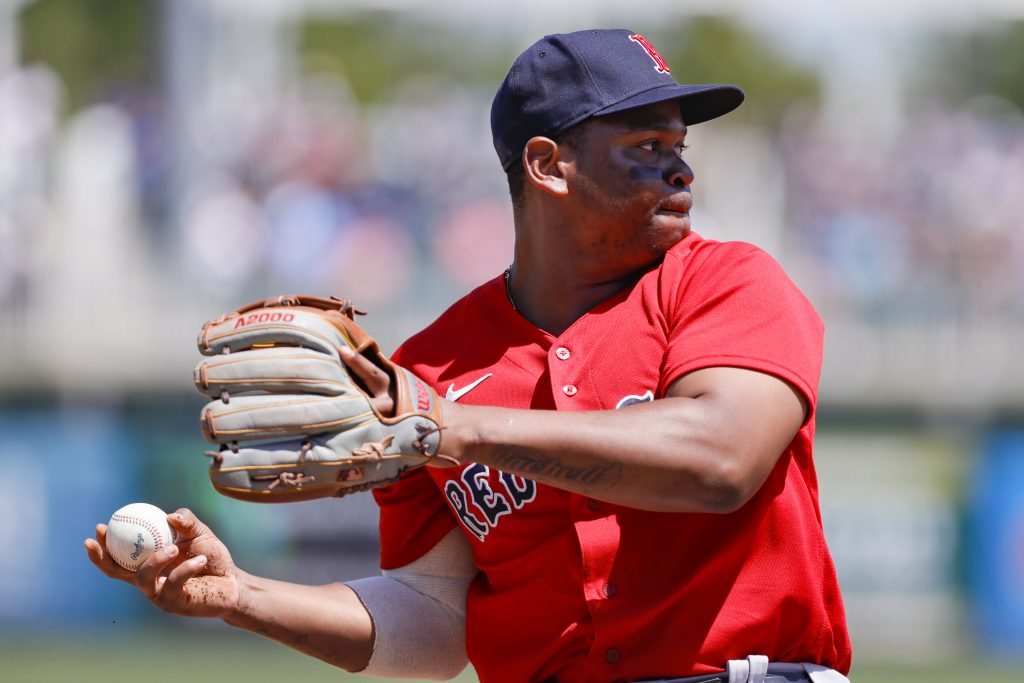
Prior to the start of the season, the Red Sox and third baseman Rafael Devers engaged in some extension talks that didn’t yield much progress, as the two sides were reportedly around $100MM apart in their floated prices. Some more details on the negotiations were shared by The Boston Globe’s Alex Speier, who reports that the Sox viewed Matt Olson’s extension with the Braves as a possible model for a Devers deal.
Olson signed his eight-year, $168MM extension (with a $20MM club option for 2030) just a day after Atlanta landed the first baseman in a blockbuster trade with the Athletics. Both Devers and Olson are in the same service-time class, and were under control through the 2023 via a final year of arbitration eligibility. Back in April, MLBTR’s Anthony Franco looked at Devers through the lens of the Olson extension, but also made the point that “obviously, Olson and Devers don’t make for an apples-to-apples comparison.”
From Boston’s perspective, eight years and $168MM had been established as the market rate for a star first baseman, and Speier writes that the Sox were looking for an extension in that range “citing the likelihood that Devers would spend much of the contract either at first base or designated hitter.”
There have long been questions about Devers’ long-term viability as a third baseman, as (depending on the defensive metric of choice) his glovework has generally been subpar for his entire career. This year, Devers has a -6.6 UZR/150, -2 Defensive Runs Saved, and an even 0 in Outs Above Average, indicating some small improvement from his previous numbers. For what it’s worth, OAA is the metric that has been most favorable to Devers, as his glovework in 2019 received a whopping +17 OAA (with a more modest +2.4 UZR/150 and -5 DRS).
Olson happens to be one of the league’s better defensive first basemen, which undoubtedly also figured into the argument the Red Sox put forth to Devers’ agents at Rep 1 Baseball. However, it is also pretty easy to understand the counter-arguments that Devers’ camp could make. Devers is over two and a half years younger than Olson, third base is the more difficult position, and Devers has more upside at the plate.
From 2017-2021, Devers hit .279/.338/.509 with 112 home runs over 2344 plate appearances. Over that same stretch, Olson hit .254/.348/.515 with 142 homers in 2341 PA, with Olson also playing his home games in the pitcher-friendly Coliseum while Devers hit at Fenway Park. Of course, Devers also began his MLB career at age 20, and he has already been a significant contributor to a World Series champion.
The 2022 season has done more to enhance Devers’ case for a huge contractual investment. Devers leads all AL batters with 112 hits at the All-Star break, with 22 homers and a .324/.379/.601 slash line in 377 PA. A below-average walk rate (a consistent issue for Devers throughout his career) is pretty much the only blemish on an otherwise strong Statcast page, as while Devers’ whiff rate and chase rate are both mediocre, he is in the 70th percentile for strikeout rate — his 18% K% is the second-lowest of his career. Devers’ 170 wRC+ is the fourth-best of any qualified batter in the league, topped by only Yordan Alvarez, Paul Goldschmidt, and Aaron Judge.
Devers is scheduled to reach free agency in advance of his age-27 season, and this earlier entry to the open market carries the promises of more prime years under contract, and thus a bigger asking price for any interested team. Devers avoided arbitration with the Sox and is playing the 2022 season on an $11.2MM salary, so it is easy to project that his 2023 arb salary will be in the $16MM range. Assuming that Boston’s extension offer covered the 2023 campaign and assuming an offer in the neighborhood of Olson’s deal, that would’ve priced Devers’ first seven free agent years (his age-27-33 years) at roughly $152MM.
Beyond trying to find a magic salary number that is acceptable to both sides, the larger question could be whether the Red Sox have interest in locking up Devers at anything that isn’t a semi-bargain price. On paper, there’s plenty of long-term room in Boston’s payroll for a Devers mega-deal. A lot of money is coming off the books after the season, with the likes of Xander Bogaerts, J.D. Martinez, Nathan Eovaldi, Christian Vazquez, Michael Wacha, Enrique Hernandez, Jackie Bradley Jr., and James Paxton all either scheduled for free agency, or potential free agents based on contractual options (such as Bogaerts’ opt-out clause, which he is widely expected to exercise).
Locking up Devers would be a way to reinforce the lineup should some or all of those batters depart, and essentially make him the face of the franchise for the remainder of the decade. Trevor Story’s six-year, $140MM free agent deal is the largest contract given to any Red Sox player since Chaim Bloom was hired as the organization’s chief baseball officer. On the extension front, the Sox gave an early-career deal to Garrett Whitlock and short-term extensions to Matt Barnes and Andrew Benintendi, but nothing remotely in the realm of what a Devers extension would cost. It remains to be seen how Bloom is planning to remodel Boston’s roster during what could be a rather transformative offseason, and of course, there is still plenty of time for further negotiations with Devers before the third baseman hits the open market.
Credit : Source link






